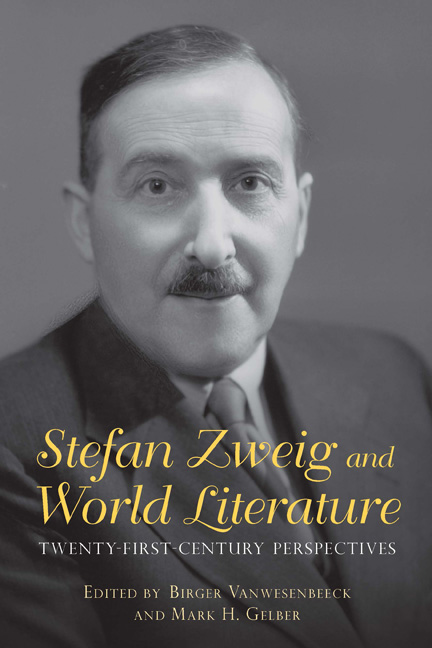Book contents
- Frontmatter
- Dedication
- Contents
- List of Illustrations
- Acknowledgments
- Introduction
- Part I Reception
- Part II Drama and Fiction
- Stefan Zweig's Drama Jeremias in Context
- 3 “That Voice in the Darkness!”: Technologies of the Tropical Talking Cure in Stefan Zweig's Der Amokläufer and Verwirrung der Gefühle
- 4 Narrating Alterity: Stefan Zweig, Emmanuel Levinas, and the Trauma of Redemption
- Part III Criticism and Essays
- Part IV Politics and Exile
- Notes on the Contributors
- Index
4 - Narrating Alterity: Stefan Zweig, Emmanuel Levinas, and the Trauma of Redemption
from Part II - Drama and Fiction
Published online by Cambridge University Press: 05 May 2015
- Frontmatter
- Dedication
- Contents
- List of Illustrations
- Acknowledgments
- Introduction
- Part I Reception
- Part II Drama and Fiction
- Stefan Zweig's Drama Jeremias in Context
- 3 “That Voice in the Darkness!”: Technologies of the Tropical Talking Cure in Stefan Zweig's Der Amokläufer and Verwirrung der Gefühle
- 4 Narrating Alterity: Stefan Zweig, Emmanuel Levinas, and the Trauma of Redemption
- Part III Criticism and Essays
- Part IV Politics and Exile
- Notes on the Contributors
- Index
Summary
Gerontophagy is the fate which awaits the illustrious dead. It is, as historian C. Vann Woodward explains, the “primitive ritual of eating one's elders.” What Woodward is referring to is the sort of symbolic mastication we inflict on politicians, public figures, and artists after their deaths. Today's celebrities are tomorrow's dinner; we gnaw at their every flaw, and when we're sated, there often isn't much left. Consider, for example, the fate of Stefan Zweig.
In the years between wars, Stefan Zweig was one of the world's most popular authors. Since his death in 1942, though, his reputation has endured repeated attacks. In 1943, Hannah Arendt wrote what Michael Steinberg calls a “withering review” of Zweig's memoir, The World of Yesterday; as Steinberg points out, Arendt rejected not just this one book but Zweig's whole approach to life and art. In 1984, Sylvia Patsch bemoaned the fact there was so little discussion of Zweig's relationship with British literature; Patsch noted that one obvious reason for this was that so little of Zweig's work was available in English translation. Indeed, a 1987 bibliographic study of Zweig's work in English produced “disconsolate results.” While Zweig's work was, of course, available in German, very little of was still available in English, at least not in the United States. Not only was Zweig's work difficult to find, the bibliographer also sadly reported that, “not one of my students had ever heard of Stefan Zweig, and only a few of my colleagues knew anything about him.” Another observer, in 1999, noted Zweig's disappearance, and remarked that “the reception of Zweig's work has suffered immensely since the Second World War rendered anachronistic his dream of universal humanity.” Probably the most thorough critique of Zweig's art occurs in an article by Leon Botstein, in which he notes that Zweig's work “appears to us moribund, anachronistic, naïve, and superficial.”
- Type
- Chapter
- Information
- Stefan Zweig and World LiteratureTwenty-First Century Perspectives, pp. 74 - 90Publisher: Boydell & BrewerPrint publication year: 2014
- 1
- Cited by

